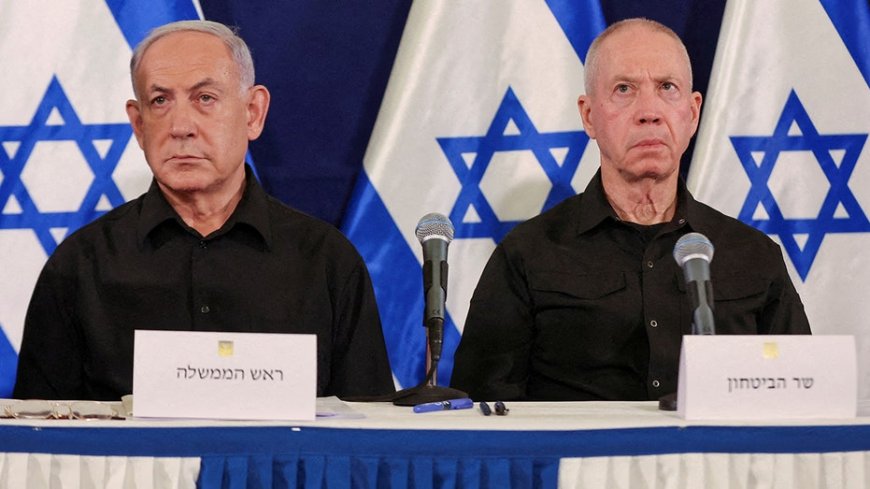Israeli Prime Minister Benjamin Netanyahu fires Defense Minister Yoav Gallant
Israeli Prime Minister Benjamin Netanyahu has removed Yoav Gallant as his defense minister, his office announced Tuesday.

Israeli Prime Minister Benjamin Netanyahu has fired his defense minister, Yoav Gallant, the Israeli leader announced Tuesday.
Netanyahu cited significant differences between their views on how to proceed in Gaza and Lebanon, as well as a lack of trust between the pair. Netanyahu's office shared a letter, written in Hebrew, that was delivered to Gallant on Tuesday notifying him of his removal.
"In the midst of war, more than ever, complete trust is required between the Prime Minister and the Defense Minister," Netanyahu said. "Unfortunately, even though such trust was present during the first months of the military campaign, and we had a very productive cooperation, during the past several months this trust between myself and the Defense Minister has begun to crack."
"I have made multiple attempts to resolve these disagreements, but they became increasingly wider. They were also brought to the knowledge of the public in an inappropriate manner, and what is even worse, they have reached the knowledge of the enemy; our enemies have taken great delight in these disagreements and have derived much benefit from them," he added.
IRAN AND RUSSIA CLOSE IN ON DEAL AS TEHRAN THREATENS REVENGE AGAINST ISRAEL
Netanyahu later announced that the country's Foreign Minister, Israel Katz would replace Gallant as defense minister.
"The security of the State of Israel always was, and will always remain my life’s mission," Gallant said in a statement following his dismissal on Tuesday.
Israeli opposition leader Yair Lapid condemned Gallant's firing in a statement.
"Netanyahu is selling out Israel’s security and the IDF’s fighters for [his own] disgraceful political survival. The ultra-right-wing government prefers the [draft] dodgers over the those who serve," Lapid accuses — calling on his party’s supporters and "all Zionist patriots to take to the streets tonight in protest," he wrote on social media.
In later remarks to the media, Gallant said he and Netanyahu disagreed on three issues; the drafting of Haredi men into the army, getting the hostages back home, and a state commission of inquiry into the intelligence failures of the Oct. 7th attacks.
On the need for a commission, he said, "We must learn lessons and draw conclusions following a thorough investigation of events. In discussing the national level – the political, defense, military levels and the need to uncover the truth and learn lessons, there is only one way: the establishment of a state commission of inquiry."
Protesters angry with the decision to fire Gallant took the streets, gathering in Tel Aviv and outside Netanyahu's private residence in Jerusalem.
Israeli NGO The Movement for Quality Government in Israel echoed Lapid's condemnation, calling the move a "serious blow to national security."
The move comes as Israel is engaged in multiple conflicts, fighting Hamas in Gaza and Hezbollah in Lebanon, as well as exchanging long-range blows with Iran.
Netanyahu warned Iran last week that Israel may target Tehran's nuclear program if the country moves forward with another attack on Israel.
ISRAEL CEASE-FIRE PLAN FOR LEBANON SEEKS TO BYPASS UN, AS US MEDIATORS TRAVEL TO JERUSALEM FOR TALKS
"The supreme objective that I have set for the IDF and the security services is to prevent Iran from attaining nuclear weapons," Netanyahu said while speaking at a course graduation ceremony for soldiers in the Israel Defense Forces (IDF). "Halting the nuclear program has been – and remains – our chief concern."
"I have not taken, we have not taken, and we will not take, our eyes off this objective," he added.
Netanyahu’s suggestion that Israel could next target Iranian nuclear facilities is in line with other comments made by the IDF that vowed to escalate its attack "capabilities" and target hit list should Iran follow through with another attack on the Jewish state.
The U.S. – Israel’s chief ally in its fight against Hamas, Hezbollah and Iran – has repeatedly warned Jerusalem against hitting Iran’s energy infrastructure, in particular, its nuclear and oil facilities, out of concern it could prompt an outright regional war.
Reports from last week suggested that Iran could be waiting until after the U.S. presidential election.
Fox News' Yonat Friling and Caitlin McFall contributed to this report.


























































